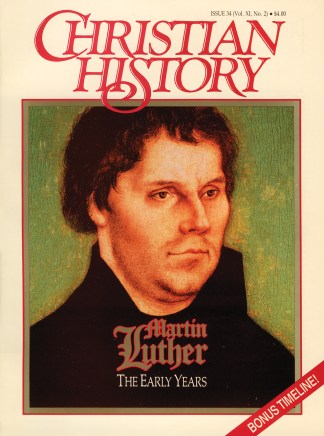Martin Luther’s 95 Theses are often considered a charter, a bold declaration of independence for the Protestant church.
But when he wrote nearly 100 points of debate in Latin, Luther was simply inviting fellow academics to a “Disputation on the Power and Efficacy of Indulgences,” the theses’ official title. (The debate never was held, because the theses were translated into German and distributed widely, creating an uproar.)
What were indulgences? In the sacrament of penance, Christians confessed sins and found absolution for them. The process of penance involved satisfaction—paying the temporal penalty for those sins. Under certain circumstances, someone who was truly contrite and had confessed his sins could receive partial (or, rarely, complete) remission of temporal punishment by purchasing a letter of indulgence.
In the 95 Theses, Luther did not attack the idea of indulgences, for in Thesis 73 he wrote, “… the pope justly thunders against those who by any means whatsoever contrive harm to the sale of indulgences.”
But Luther strongly objected to the abuse of indulgences—most recently under the salesmanship of Johann Tetzel. And in the process, Luther, though probably not fully aware of it, knocked down the pillars supporting many practices in medieval Christianity.
Key Statements
Here are thirteen samples of Luther’s theses:
1. When our Lord and Master, Jesus Christ, says “Repent ye,” etc., he means that the entire life of the faithful should be a repentance.
2. This statement cannot be understood of the sacrament of penance, i.e., of confession and satisfaction, which is administered by the priesthood.
27. They preach human folly who pretend that as soon as money in the coffer rings a soul from purgatory springs.
32. Those who suppose that on account of their letters of indulgence they are sure of salvation will be eternally damned along with their teachers.
36. Every Christian who truly repents has plenary [full] forgiveness both of punishment and guilt bestowed on him, even without letters of indulgence.
37. Every true Christian, whether living or dead, has a share in all the benefits of Christ and the Church, for God has granted him these, even without letters of indulgence.
45. Christians should be taught that whoever sees a person in need and, instead of helping him, uses his money for an indulgence, obtains not an indulgence of the pope but the displeasure of God.
51. Christians should be taught that the pope ought and would give his own substance to the poor, from whom certain preachers of indulgences extract money, even if he had to sell St. Peter’s Cathedral to do it.
81. This shameless preaching of pardons makes it hard even for learned men to defend the pope’s honor against calumny or to answer the indubitably shrewd questions of the laity.
82. For example: “Why does not the pope empty purgatory for the sake of holy love … for after all, he does release countless souls for the sake of sordid money contributed for the building of a cathedral? …”
90. To suppress these very telling arguments of the laity by force instead of answering them with adequate reasons would be to expose the church and the pope to the ridicule of their enemies and to render Christians unhappy.
94. We should admonish Christians to follow Christ, their Head, through punishment, death, and hell.
95. And so let them set their trust on entering heaven through many tribulations rather than some false security and peace.
Within two months, Johann Tetzel fired back with his own theses, including: “Christians should be taught that the Pope, by authority of his jurisdiction, is superior to the entire Catholic Church and its councils, and that they should humbly obey his statutes.”
Copyright © 1992 by the author or Christianity Today/Christian History magazine. Click here for reprint information on Christian History.










